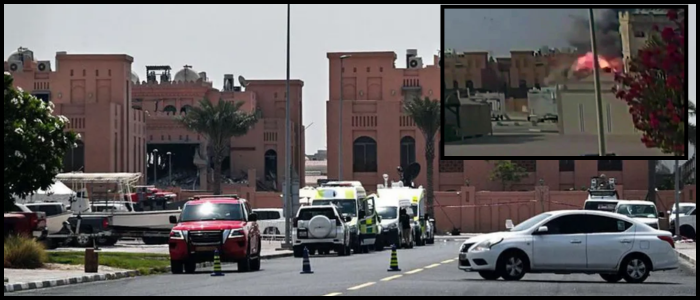Qatar's interior ministry confirmed three of the five Hamas members killed had been identified, noting that Corporal Badr al-Humaidi, a security officer from Qatar, had been identified. The ministry indicated human remains had been found "in different locations," and specialized teams conducted their work, while human remains were identified among the dead by name, including Humam al-Hayya, Khalil al-Hayya's son, office director Jihad Labad, and bodyguards Moamen Hassouna and Abdullah Abdul Wahid. The Ministry suggested Khalil al-Hayya was "missing" and had not been seen in public since the attack on Tuesday.
Regional and Global Implications
The Prime Minister of Qatar, Sheikh Mohammed bin Abdul Rahman Al Thani, called the action undertaken by Israel "state terror," demanding a united response in the region, and warned the air raid may have thwarted hopes for a ceasefire, stating it "just killed any hope" and for 48 hostages, of which 20 are presumed to be alive in Gaza.
On Wednesday, Israeli Prime Minister Benjamin Netanyahu defended this action, contending the airstrike's intent aimed at terrorists' masterminds who planned the October 7, 2023, attacks and ensuing casualties of 1,200 people and 251 taken hostage. Netanyahu insisted that Israel does not intend to stop destroying Hamas leaders, regardless of which nation they seek to shelter in. Netanyahu suggested that it can "open the door to an end to the war," noting Israel would accept the US offer for a ceasefire.
At the same time, Hamas claimed the assassination attempt was a failure and that its delegation for negotiations survived. Hamas condemned the bombing as a "heinous crime," which they have committed without providing evidence about the survival of senior leaders.
Growing Diplomatic Tension
The bombing caused profound diplomatic tensions. Sheikh Mohammed reiterated it was ultimately Netanyahu that "needs to be brought to justice," reinforcing the war crimes warrants issued against him and their former Defence Minister Yoav Gallant from the International Criminal Court as it relates to alleged war crimes in Gaza.
U.S. President Donald Trump condemned the air strike, noting it was a unilateral bombing attack into an ally of the US "territory." Trump stated that although eliminating Hamas is a legitimate goal, the bombing of Qatar was definitely not in the interest of the US or Israel. Trump contended that Washington attempted to notify Qatar that the bombing was occurring, but it was only able to do so sufficiently after the fact.
The Emir of Qatar, Sheikh Tamim bin Hamad Al Thani, received messages of solidarity from leaders within the region. The President of the UAE, Sheikh Mohammed bin Zayed Al Nahyan, travelled to Doha to denounce the bombing as an act against stability in the Middle East, while the Saudi Crown Prince, Mohammed bin Salman Al Saud, remarked it was "murderous aggression." Subsequently, plans were made for a regional summit in Qatar to discuss a collective response.
World

Qatar searches after Israeli strike on Hamas leaders

On Wednesday, Qatar announced that authorities were still searching for two missing people and trying to identify human remains resulting from an Israeli bombing raid in Doha targeting senior leaders of Hamas. The bombing hit civilian buildings in northern Doha, where members of the group's political bureau were meeting to discuss a new US offer designed to restore a ceasefire and release hostages.















